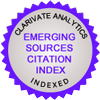Comparative analysis of malicious android-based software detection with trending metaheuristic algorithms
Mehmet Şirin Beştaş1, Özlem Batur Dinler21Mehmet Şirin Beştaş, Siirt University, Faculty Of Engineering, Department Of Computer Engineering, Siirt, Turkey, (orcıd: 0000-0001-6561-4378), mehmetsirinbestas@gmail.com2Özlem Batur Di̇nler, Siirt University, Faculty Of Engineering, Department Of Computer Engineering, Siirt, Turkey, (orcıd: 0000-0002-2955-6761 ), o.b.dinler@siirt.edu.tr
Today, Android malware threats and attacks are rapidly increasing due to their use and popularity. Therefore, the need for systems effectively detecting malware is also increasing day by day. This study proposes the use of various trending metaheuristic algorithms for optimal feature selection (FS) in the detection of Android malware. For this purpose, the ten most prominent recent metaheuristic algorithms (RMAs) for feature selection such as Artificial Bee Colony Algorithm (ABC), Firefly Algorithm (FA), Grey Wolf Optimisation (GWO), Ant Lion Optimisation (ALO), Crow Search Algorithm (CSA), Sine Cosine Algorithm (SCA), Whale Optimisation Algorithm (WOA), Salp Swarm Algorithm (SSA), Harris Hawk Optimization (HHO) and Butterfly Optimization Algorithm (BOA) were used for feature selection in this study. The efficiency of these algorithms is evaluated with five different machine learning (ML) methods on two well-known datasets of Android applications (Drebin-215 and Malgenome-215). The results obtained are also compared with five well-known and widely used conventional metaheuristic algorithms (CMAs) for solving this problem. Extensive experimental results show that incorporating RMA into Android malware detection is a valuable approach.
Keywords: Android, Feature selection, Machine learning, Malicious software, Recent Metaheuristic algorithms.
Kötü amaçlı android tabanlı yazılım tespitinin trend meta-sezgisel algoritmalar ile karşılaştırılmalı analizi
Mehmet Şirin Beştaş1, Özlem Batur Dinler21Mehmet Şirin Beştaş, Siirt Üniversitesi, Mühendislik Fakültesi, Bilgisayar Mühendisliği Abd, Siirt, Türkiye, (orcıd: 0000-0001-6561-4378), mehmetsirinbestas@gmail.com2Özlem Batur Di̇nler, Siirt Üniversitesi, Mühendislik Fakültesi, Bilgisayar Mühendisliği Abd, Siirt, Türkiye, (orcıd: 0000-0002-2955-6761 ), o.b.dinler@siirt.edu.tr
Günümüzde Android kötü amaçlı yazılım tehdit ve saldırıları, kullanımları ve popülerlikleri nedeniyle hızla artmaktadır. Bu nedenle, kötü amaçlı yazılımları etkili bir şekilde tespit edebilecek sistemlere olan ihtiyaç da gün geçtikçe artmaktadır. Bu çalışma, Android kötü amaçlı yazılımların tespitinde optimum özellik seçimi (FS) için trend olan çeşitli meta-sezgisel algoritmaların sarmalama yöntemi ile kullanılmasını önermektedir. Bu amaçla, bu çalışmada Yapay Arı Kolonisi Algoritması (ABC), Ateş Böceği Algoritması (FA), Gri Kurt Optimizasyonu (GWO), Karınca Aslanı Optimizasyonu (ALO), Karga Arama Algoritması (CSA), Sinüs Kosinüs Algoritması (SCA), Balina Optimizasyon Algoritması (WOA), Salp Sürü Algoritması (SSA), Harris Şahin Optimizasyonu (HHO) ve Kelebek Optimizasyonu Algoritması (BOA) gibi özellik seçiminde en öne çıkan on güncel meta-sezgisel algoritma (RMA) kullanılmıştır. Bu algoritmaların verimliliği, Android uygulamalarının iyi bilinen iki veri kümesi (Drebin-215 ve Malgenome-215) üzerinde beş farklı makine öğrenmesi (ML) yöntemi ile değerlendirilmiştir. Ayrıca, elde edilen sonuçlar bu problemin çözümünde yaygın olarak kullanılan ve iyi bilinen beş geleneksel metasezgisel algoritma (CMAs) ile de karşılaştırılmıştır. Kapsamlı deneysel sonuçlar, RMAnın Android kötü amaçlı yazılım tespitine dahil edilmesinin değerli bir yaklaşım olduğunu göstermektedir.
Anahtar Kelimeler: Android, Özellik seçimi, Makine Öğrenmesi, Kötü amaçlı yazılım, Güncel meta-sezgisel algoritmalar
Manuscript Language: English





